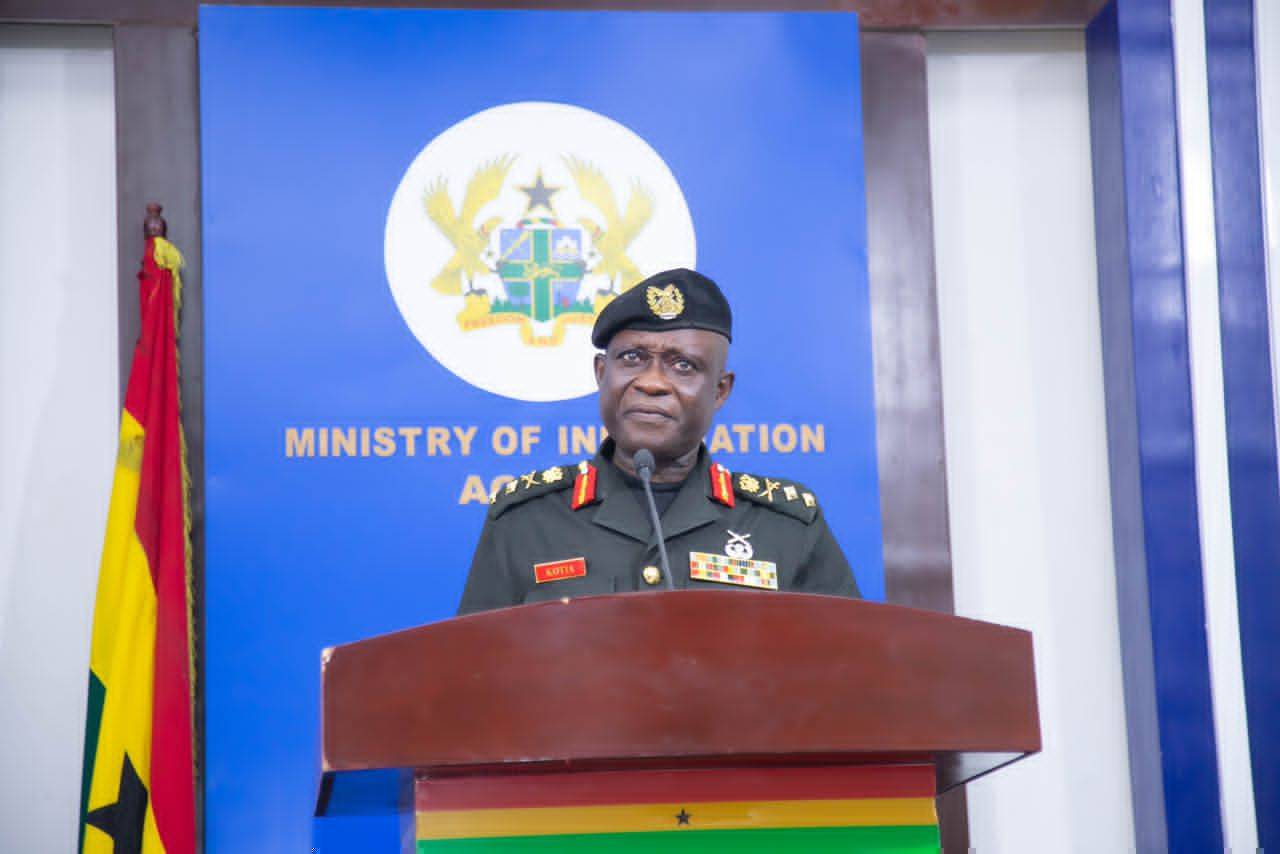The Ghana Boundary Commission (GhBC) has for the past years made significant efforts towards the reaffirmation, demarcation and delimitation of Ghana’s international land and maritime boundaries to ensure that the territorial sovereignty of the country is always respected.
The activities, efforts and achievements have all been geared towards the fulfilment of the Commission’s mandate as spelt out by law and the strategic objectives set out by the Commission.
The National Coordinator for Ghana Boundary Commission, Major General Emmanuel W. Kotia who made these remarks during a press briefing in Accra today noted that the Commission’s mandate has a broader implication for safeguarding the state’s territory at all times in collaboration with various actors within and outside Ghana.
“The Commission’s major land boundary activities in the Northern Corridor (Ghana-Burkina Faso) are the Multi-agency Mapping and Operational exercises, as well as the Joint Land Boundary Commission consultative meeting with Burkina Faso.
“Among the activities in the Western Corridor (Ghana-Cote d’Ivoire) were mapping exercises and multi-agency assessments, meetings with the National Boundary Commission of Cote d’Ivoire, and Joint Technical Committee Meetings in Abidjan and Accra,” he emphasized.He added that land boundary activities in the Eastern Corridor (Ghana-Togo), included re-affirmation exercise at Aflao and Akanu, re-affirmation of land boundary pillars (Phase 1) covering an approximate distance of 50 km along the International Boundary Line from Aflao/Lomé to Deme/Bagbe, and re-affirmation of land boundary pillars (Phase 2) covering an approximate distance of 60 km along the International Boundary Line from Bagbe – Agortime Afegame.
On maritime boundary activities, he indicated that the National Boundary Commission of Nigeria invited GhBC to an introductory meeting in Abuja in October 2021 to discuss issues related to Joint processes toward the proper delimitation of the common maritime boundary between the two countries.
“Ghana and Togo have held a series of boundary negotiation meetings in Accra and Lomé over the period to resolve a longstanding maritime dispute between the two countries. Negotiations are still ongoing with a positive outcome expected,” he noted.
Major Kotia further disclosed that the Boundary Commissions of Ghana and Cote d’Ivoire had three bilateral meetings to discuss the implementation of the 2017 ITLOS ruling and other cross-border cooperation activities adding, “The two Boundary Commissions have established a Joint Technical Committee on Maritime and Land boundary issues”.
He stated that the GhBC acquired state-of-the-art Delta Quad Maritime surveillance drones with GNPC support for joint maritime boundary inspections with the Ghana Navy along Ghana’s eastern and western maritime borders.
“Other key activities during the period include admission to the African Union Border Programme, advocacy for Ghana’s ratification of the AU Convention on Cross-Border Cooperation (Niamey Convention), search/retrieval of legacy documents defining Ghana’s borders with neighbouring states, and joint commemoration of the 12th African Border Day with the National Boundary Commission of Côte d’Ivoire from 7 to 10 June 2022,” he added.
The National Coordinator also indicated that Ghana’s Parliament ratified the Niamey Convention earlier this year and that Ghana would deposit Instruments by the middle of July 2023.
“17 out of 55 AU Member States have signed the Convention. Only 9 Countries have ratified it and 5 have deposited it with the AU Commission in accordance with Article 17 of the Convention. The 9 countries are Benin, Burkina Faso, Guinea, Mali, Niger, Togo, Ghana, Cote d’Ivoire and Nigeria,” he added.
He outlined the Commission’s anticipated activities, which include consultative meetings with neighbouring Boundary Commissions, continuing maritime negotiations with Togo and implementing a mutually agreed maritime boundary line between the two countries, Land Boundary and re-affirmation exercises with Togo, Burkina Faso, and Cote d’Ivoire.
Major General Kotia also appealed to the international partners and various agencies to assist the Commission to support deprived community border areas.
‘One of our key strategic objectives is to source funding to support them by rehabilitating health clinics, roads, and water supplies in deprived border communities,” he stated.




No comments yet
Be the first to share your thoughts!